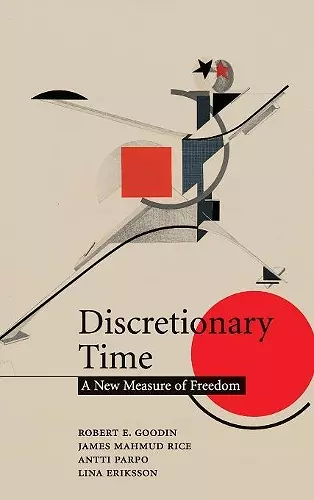Discretionary Time
A New Measure of Freedom
Robert E Goodin author Lina Eriksson author James Mahmud Rice author Antti Parpo author
Format:Hardback
Publisher:Cambridge University Press
Published:21st Feb '08
Currently unavailable, and unfortunately no date known when it will be back
This hardback is available in another edition too:
- Paperback£30.99(9780521709514)

A novel study of how much control people have over their time and work-life balance.
The authors develop a novel way of measuring 'discretionary time': time which is free to spend as one pleases. Using data from six different countries, they examine how much control people have over their time and how much they could have under alternative welfare, gender or household arrangements.A healthy work-life balance has become increasingly important to people trying to cope with the pressures of contemporary society. This trend highlights the fallacy of assessing well-being in terms of finance alone; how much time we have matters just as much as how much money. The authors of this book have developed a novel way to measure 'discretionary time': time which is free to spend as one pleases. Exploring data from the US, Australia, Germany, France, Sweden and Finland, they show that temporal autonomy varies substantially across different countries and under different living conditions. By calibrating how much control people have over their time, and how much they could have under alternative welfare, gender or household arrangements, this book offers a new perspective for comparative cross-national enquiries into the temporal aspects of human welfare.
'Only a group of scholars led by Bob Goodin could be sufficiently intellectually daring to replace money with leisure time as the metric of welfare achievement. In an era in which 'time to stand and stare' becomes ever scarcer, this is a book on the impacts of public policy which really matters.' Francis G. Castles, University of Edinburgh
'Confronting Marx's capitalist 'realm of necessity' head on, Goodin and his co-authors replace money with time as the measure of freedom and ask: 'how much control do citizens of OECD countries have over their allotments of time?' Don't be intimidated by the numbers and tables - the result is a fresh view of cross-national inequities, replete with new recipes for reform.' Stephan Leibfried, University of Bremen and Head of the Research Center for Transformations of the State
'The conclusion of Discretionary Time, an academic text based on a wealth of data from OECD countries, is that most of us have no one but ourselves to blame for our time-scarce predicament. Time pressure, they argue, suggests compulsion.' Financial Times
'The book articulates its argument over roughly 450 pages … Its substantial length and technicalities go unnoticed, partly for the easily accessible language, partly for the neat and rational organization of the argument's frame … case studies … provide a wide and attractive empirical articulation for [the authors'] theoretical framework.' Journal of Economics and Philosophy
'Discretionary Time: A New Measure of Freedom is an interesting work of theory and policy … a notable work.' Political Studies Review
'This is a carefully thought-out and crafted book … with strong conceptual and methodological contributions indeed.' Feminist Economics
'This book makes fascinating reading and invites further questions.' Managing Leisure
- Winner of Stein Rokkan Prize, International Social Science Council 2009
ISBN: 9780521882989
Dimensions: 235mm x 160mm x 32mm
Weight: 898g
482 pages